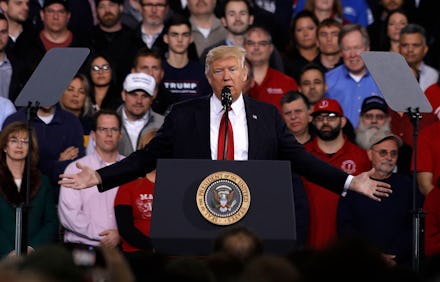Here's the fatal flaw in both versions of Trump's Muslim ban

In February, Donald Trump's hastily thrown together first attempt to ban citizens of seven majority-Muslim countries from the United States was frozen by the courts. Rather than appeal a unanimous ruling from the 9th Circuit Court of Appeals, Trump decided to back off and issue a modified travel ban.
But the second bit at the apple also has a lot of worms. Just before the ban was scheduled to go into effect, a federal judge in Hawaii issued a restraining order stopping it, and later, another judge in Maryland also ruled against it. The judges were able to use one particularly powerful weapon against the executive order: the words of Trump and his close associates.
The modified ban was designed to pass constitutional muster by being narrower and, allegedly, more carefully tailored than the original. One country — Iraq — was removed from the list of countries affected by the order. The 90-day ban no longer applied to people who already had travel visas or green cards. And a ban on accepting Syrian refugees was changed, allowing them to apply under newly restrictive criteria after a 120-day freeze.
But the core legal arguments against the original ban still apply to the new one. In a closely argued opinion U.S. District Judge Derrick Watson found the a "strong likelihood of success" that the new ban was unconstitutional, preventing it from going into effect.
Watson's argument that the ban was likely to be found unconstitutional was based on the Establishment Clause of the First Amendment. As Watson observed, quoting the 1982 case Supreme Court case Larson v. Valente, "the clearest command of the Establishment Clause is that one religious denomination cannot be officially preferred over another." And while the travel ban does not mention religion, Watson concluded that it was targeted at Muslims. Watson found that, when the ban was considered in context, it disfavored Muslims and did not otherwise have a "secular purpose," and therefore is likely to be ruled to violate the First Amendment.
It is hard to argue that what you've called an intended 'Muslim ban' is not targeted at Muslims.
In one particularly strong passage, Watson rebuked the administration's assertion that because the ban does not apply to all Muslims it therefore cannot be discriminatory. The argument is silly. It would be like saying that an executive order denying Pell Grants to colleges with a majority of African-American students would not be discriminatory if it only applied in 15 states. Watson was having none of it: "The illogic of the government's contentions is palpable. The notion that one can demonstrate animus toward any group of people only by targeting all of them at once is fundamentally flawed."
The administration's attempts to argue the ban was not unconstitutionally targeted at Muslims then run into an obvious problem — the president's own words. It is hard to argue that what you've called an intended "Muslim ban" is not targeted at Muslims. While some defenders of the administration have argued the courts should not consider Trump's public statements when assessing the legality of his executive orders, this argument is transparently wrong. When courts determine whether an order that is neutral on its face is a pretext for discrimination, the intent of the persons designing, announcing and executing the order is always relevant, and public statements are certainly evidence of intent.
This was bad news for Trump. Watson was able to cite statements from Trump's own aides — including a statement from senior adviser Stephen Miller just before the revised ban was announced — admitting that the initial travel ban was targeted at Muslims and that the second ban was designed to achieve the same outcome as the first one. Watson was compelled to conclude that "these plainly-worded statements, made in the months leading up to and contemporaneous with the signing of the executive order, and, in many cases, made by the executive himself, betray the executive order's stated secular purpose."
To be clear, these statements in themselves are not irrefutable evidence the travel ban is discriminatory. It would be possible for the administration to survive a constitutional challenge by showing that the ban had a legitimate secular purpose that could not be achieved otherwise. But it completely failed to do so. The selection of countries — whether seven or six — is arbitrary. Nothing about the selection of countries can be explained by national security concerns given that no acts of terrorism have been committed by nationals from any of the countries included in the ban (the ban would have applied to zero 9/11 hijackers, for example). It is hard to explain the ban as being motivated by anything but anti-Muslim bias.
The fate of the modified travel ban remains unclear. Trump, who called the ruling "unprecedented overreach" as part of an angry rant against the opinion he hadn't read at a rally in Nashville, will almost certainly appeal the ruling. But the arguments against it are strong, and the lack of message discipline on the part of the Trump administration will make it hard to defend the ban convincingly.